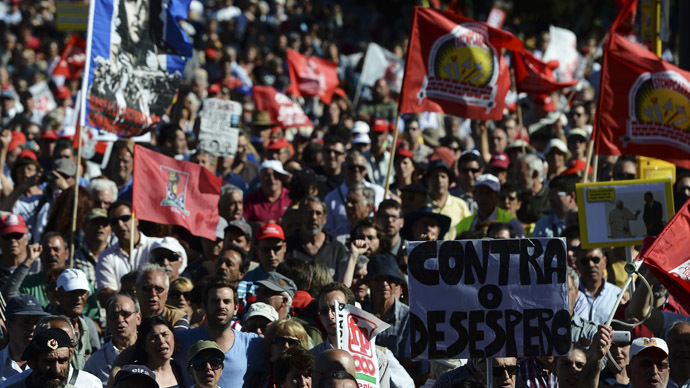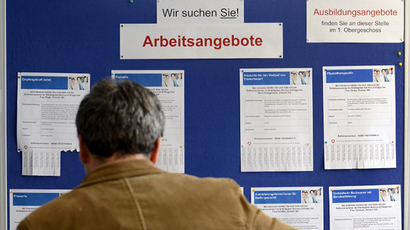Bad bonds: Is Portugal the next Greece?

Coalition leaders will reconvene in Portugal in an emergency meeting to address Lisbon’s plan to complete its $102 billion (78 billion euro) bailout by next year, protect the euro, and restore bond yields.
Shockwaves raced through European markets after two key ministers
resigned on Tuesday over the appointment of a new pro-austerity
Finance Minister, spurring fears of political and economic
instability.
The announcement sent tremors through European markets, as
Portugal’s main index dropped nearly 7 percent and euro stocks
plummeted.
“The situation in most of Portugal's economy is far from
stable,” said Anna Bodrov, an analyst at Investkafe.
To enable recovery on trading floors, Lisbon’s financial
regulator banned short-selling of Banco Comercial Portuges, Banco
Espirito Santo and Sonae Industria securities from 8:00am. to
11:59pm on July 4. These banks all experienced losses over 10
percent on Wednesday. The UK’s Financial Conduct Authority has
also banned the short-selling.
Portuguese 10-year bond yields spiked up to 8.11 percent on
Wednesday, but have since settled back to near 7.5 percent, after
dipping as low as 7.1 percent. Lower bond yields in the past were
hailed as testimony of recovery, so the spike, relinquished a new
wave of euro zone crisis contagion fears.
Premier Pedro Passos Coelho will meet with his right-wing
counterparts to try and defuse the looming coalition collapse
under the tightening austerity measures, which have only deepened
Portugal’s economic recession.
The Draghi factor
The Portugese bond scare will likely dominate European Central
Bank (ECB) President Mario Draghi’s press conference scheduled
for 2:30p.m in Frankfurt Thursday.
"Today's ECB policy announcement is a much larger threat to
the euro," BNP Paribas said in a note to CNBC.
Draghi will also announce the bank’s financing rate, which is
expected to remain unchanged at the record low level of 0.5
percent.
He will also likely field questions about protecting the euro and
the future of the ECB’s bond buying program.

'Elusive' recovery
As much as eurozone leaders like to boast about the end of the
euro crisis, recession is still very real in the eurozone’s
periphery economies- Portugal, Greece, Cyprus, Spain, and
Slovenia have all suffered with high bond yields. Borrowing costs
continue to rise, and export recovery remains week because all
neighboring states are experiencing the same problem: lack of
demand.
Output in Portugal contracted by 3.25 percent and its budget
deficit has ballooned to 10.2 percent year-on-year in Q1 2013, up
from 7.9 percent in the previous quarter. The IMF predicted in
June that the public debt in Portugal would rise to 124 percent
of GDP next year, an underestimation, according to many analysts.
Unemployment across the 17 euro states hit an all-time high of 19 million in May.
"Economic recovery is proving elusive," the IMF said in a May
report.
The International Monetary Fund (IMF) acknowledged that it made
‘notable failures’ in its handling of the Greek bailout,
admitting they had underestimated how deeply austerity measures
would stint growth, but are still taking the same route in
Portugal.
"It's far from over. The immediacy may have ebbed away, but I
think we're all aware that under the surface, there's still a lot
of stuff than can come back to bite us,” a source at the
finance officials’ meeting on Tuesday said, Reuters reported.














